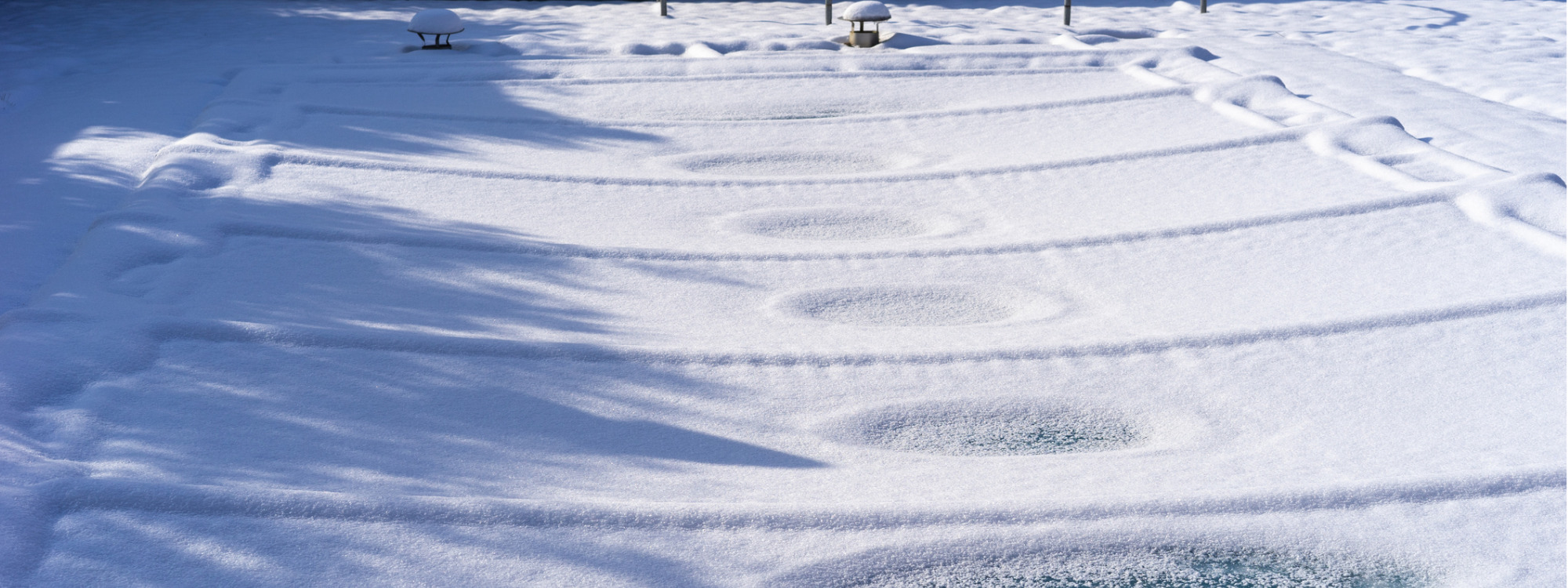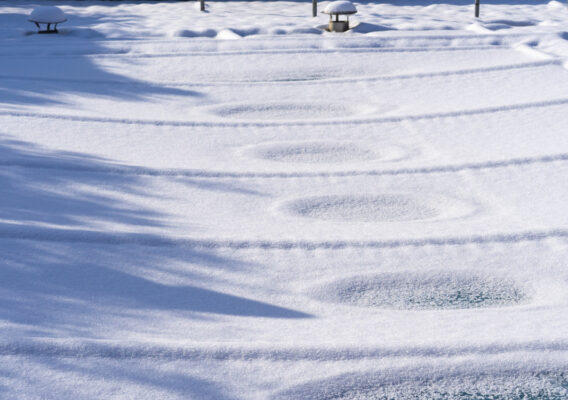Table of Contents
The Swimming Pool Store offers helpful tips for pool owners on maintaining their pools during the winter, particularly in harsh Connecticut winters.
Tips to Maintain Your Swimming Pool Over the Winter
Here are the most important tips for winter pool maintenance from swimming pool technicians with more than 50 years of experience:
 1. Inspect the Pool Cover
1. Inspect the Pool Cover
Your pool cover plays a significant role in keeping your pool clean and free from debris over the winter. To prevent damage:
- Remove Debris: Regularly clear leaves, branches, and snow from the cover. Excess debris can cause sagging or tearing, which may lead to damage to the cover and the pool.
- Prevent Water Accumulation: For solid pool covers, ensure that water is not collecting on the surface. Using a pool cover pump can help remove excess water, preventing strain and sinking. If using water bags, make sure they remain full and in place.
- Keep the Cover Tight: Check that mesh pool covers are taut and secure, as gaps can allow debris to enter the pool.
For more tips on maintaining your pool cover, check out our blog on Preventing Winter Pool Cover Failures.
2. Monitor Water Levels
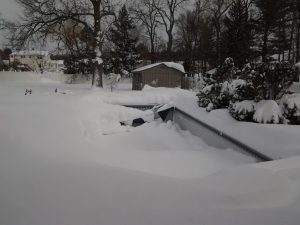 Keeping an eye on your pool’s water level is crucial to prevent damage from freezing. Here’s what to do:
Keeping an eye on your pool’s water level is crucial to prevent damage from freezing. Here’s what to do:
- Lower Water Levels: For both inground and aboveground pools, make sure the water level is below the skimmer to prevent freezing in the pipes and skimmer. If the water isn’t properly lowered, freezing temperatures can lead to cracks in the plumbing and pool structure. This is part of proper pool winterization.
- Watch for Ice: Regularly check for ice formation on the water’s surface. Ice can cause significant damage to the pool’s walls and liner if left unchecked.
For more information on managing your water levels, visit our blog post on Winterizing a Pool: What Happens to Pools Water During Winter.
3. Check Pool Equipment and Winterization
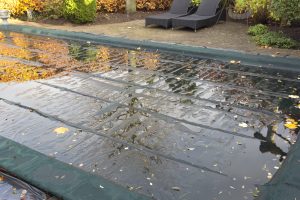
Properly winterizing your pool equipment is a key step in preventing damage. However, winter monitoring is also essential:
- Inspect Drained Equipment: Make sure your pool pumps, filters, and heaters have been properly drained and winterized. Any water left in the equipment could freeze and cause cracks.
- Watch for Rodents: Rodents can be a big problem during the winter. They may nest in pool heaters or chew through wires, leading to costly repairs. Look for signs of nesting or damage around your pool equipment.
- Move Equipment Indoors: If possible, move heaters and pool equipment inside to avoid damage from freezing or nesting animals.
To learn more about preventing rodent damage, check out our detailed guide on Protecting Your Pool Equipment from Rodents.
4. Maintain Water Chemistry
Even during the off-season, you should periodically check your pool’s water chemistry to prevent the growth of algae and the buildup of scale. Particularly in the spring, it might be a good idea to peel back the cover and add some algaecide. Here are other tips to maintain pool water chemistry during the off-season :
- Test the Water: Periodically test the pH and chlorine levels during the winter. Proper chemical balance will prevent algae growth and make it easier to reopen your pool in the spring.
- Add Chemicals as Needed: Ensure the pool has been treated with algaecide and shock when closing, and adjust as needed over the winter to keep the water clear.
For more on why chemical balance is critical, read our blog Why You Must Balance Your Water When Closing Your Pool.
5. Inspect the Pool Surroundings
Your pool’s surroundings can indicate potential issues even if you don’t see anything wrong with the pool itself:
- Look for Leaks: If the ground around the pool appears overly saturated, it could indicate a leak. Catching and repairing leaks early can prevent significant damage when the pool reopens in the spring.
- Check for Structural Damage: Look for cracks in pool walls, tiles, or decking. Freezing and thawing cycles can lead to damage if left unattended.
For more winterizing tips to help you stay ahead of these issues, visit Winterizing Tips for Pool Owners.
6. Ensure Safety Cover Fasteners are Secure
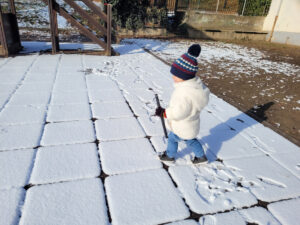
For those using safety covers, it’s essential to regularly inspect the fasteners to ensure everything remains secure:
- Check Straps and Anchors: Make sure all straps, anchors, and fasteners are tight and secure. Loose anchors can lead to the cover sagging, potentially letting debris enter the pool.
- Inspect for Wear and Tear: Regularly check the cover for any signs of damage, such as holes or stretching. If any damage is found, replace or repair the cover before it worsens.
For a full checklist of winter care steps, visit our Off-Season Swimming Pool Checklist.
By following these essential pool monitoring steps during the winter, you can prevent costly damage and ensure that your pool is ready for a smooth opening in the spring. Regular inspections and maintenance can save you time, money, and stress, allowing you to enjoy your pool when the warmer months return.
The Swimming Pool Store’s Professional Pool Closing Services
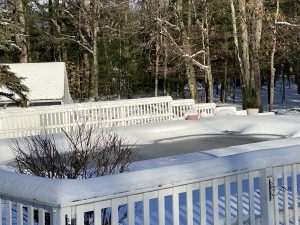 At The Swimming Pool Store, we offer comprehensive pool closing services to ensure that your pool is properly prepared for the winter months. Our experienced technicians handle everything, from cleaning and winterizing your pool equipment to securing the cover and balancing your water chemistry. By choosing our pool closing service, you’ll protect your pool from damage and make sure it’s ready for an easy and quick opening when the season returns.
At The Swimming Pool Store, we offer comprehensive pool closing services to ensure that your pool is properly prepared for the winter months. Our experienced technicians handle everything, from cleaning and winterizing your pool equipment to securing the cover and balancing your water chemistry. By choosing our pool closing service, you’ll protect your pool from damage and make sure it’s ready for an easy and quick opening when the season returns.
Learn more about how to properly close a pool, and schedule your pool closing for a hassle-free opening in the spring.
The Swimming Pool Store has over 50 years of experience helping pool owners keep their pools in top condition throughout the year. Our pool technicians provide expert advice on winterizing, pool monitoring, and proper maintenance to ensure a smooth opening in the spring. Contact us today for personalized tips on winterizing your pool in Connecticut.

